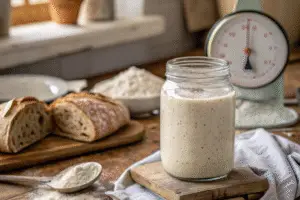If you’ve ever asked yourself, “is sourdough gluten free?”, you’re not alone. Many health-conscious eaters want to enjoy bread without triggering gluten sensitivity, and sourdough seems like a promising option.
Some claim it’s a better option for gluten sensitivity, while others say it still contains too much gluten to be safe. In this post, we’ll uncover what sourdough is, how it differs from other breads, and whether it fits into a gluten-free lifestyle.
What Is Sourdough Bread?
Sourdough is a type of bread made through natural fermentation using wild yeast and lactic acid bacteria. Unlike conventional breads that use commercial yeast, sourdough relies on a starter—a fermented mixture of flour and water—to rise.
The fermentation process:
- Breaks down gluten proteins
- Increases digestibility
- Enhances flavor and shelf life
But does that mean it’s gluten-free? Let’s dive deeper.
Is Sourdough Gluten Free?
The short answer is no—traditional sourdough is not gluten free.
While the fermentation process reduces the amount of gluten, it doesn’t eliminate it completely. That means people with celiac disease or a serious gluten intolerance should avoid it, unless it’s made from 100% gluten-free flour.
Gluten Levels in Sourdough
Studies show that long fermentation can reduce gluten content by up to 50–90%, depending on:
- The type of flour used
- Length of fermentation
- Specific strains of bacteria and yeast
However, even “low-gluten” isn’t the same as “gluten-free.”
💡 Tip: According to FDA guidelines, a product labeled “gluten-free” must contain less than 20 parts per million (ppm) of gluten.
Fermentation Matters in Sourdough
The fermentation process is at the heart of what makes sourdough unique—and it’s also what sparks the gluten confusion. During fermentation, wild yeast and bacteria break down complex carbohydrates and proteins, including gluten. This not only alters the bread’s texture and flavor but also impacts how it’s digested. Fermentation can make nutrients more bioavailable and may reduce compounds that cause bloating and discomfort. However, while this process modifies gluten, it doesn’t eliminate it entirely, which is why people with gluten-related disorders still need to proceed with caution.
When Can Sourdough Be Gluten Free?
Only sourdough made from naturally gluten-free grains like:
- Brown rice
- Buckwheat
- Millet
- Sorghum
- Quinoa
…can be considered truly gluten-free sourdough.
Make sure to look for products that are:
- Certified gluten-free
- Produced in a dedicated gluten-free facility
Benefits of Sourdough for Gluten Sensitivity
Although sourdough is not gluten-free by default, some people with non-celiac gluten sensitivity (NCGS) find it easier to digest than other breads. The natural fermentation:
- Reduces phytic acid, improving nutrient absorption
- Breaks down gluten proteins, making them less inflammatory
- Promotes gut health through beneficial probiotics
⚠️ Always consult a healthcare provider before reintroducing gluten or fermented breads into your diet.
How to Choose Gluten-Free Sourdough Bread
When shopping or baking your own, check for these key details:
- Clearly labeled “gluten-free”
- Ingredients list with gluten-free flours only
- Cross-contamination protocols followed
Want to bake your own? Try this easy gluten-free sourdough starter recipe and start experimenting at home!
Frequently Asked Questions (FAQ)
Can celiacs eat sourdough bread?
No. Traditional sourdough contains gluten and is not safe for people with celiac disease unless certified gluten-free.
Is sourdough lower in gluten than regular bread?
Yes. The fermentation process can significantly reduce gluten, but it does not eliminate it.
What kind of sourdough is gluten-free?
Only sourdough made from 100% gluten-free grains and produced under strict gluten-free conditions qualifies.
Conclusion: Should You Eat Sourdough on a Gluten-Free Diet?
In conclusion, is sourdough gluten free? Not always. While traditional sourdough contains less gluten than regular bread, it’s not safe for those with celiac disease unless it’s made from certified gluten-free flours.
For more on gut health and gluten-free living, check out our Best Gluten Free Lasagna.










3 thoughts on “Is Sourdough Gluten Free? A Complete Guide for Health-Conscious Eaters”
Comments are closed.